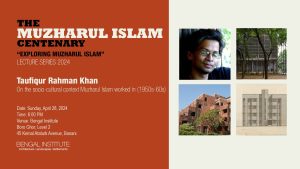
Workshop: New Urban Topologies - Dhaka
Tue 19 Nov - Thu 21 Nov' 19
A three-day workshop with selected participants and members of Färgfabriken to understand and conceptualise urban transformations in Savar.
New Urban Topologies was initiated by Färgfabriken Centre for Art, Architecture and Society in Stockholm, Sweden 6 years ago. Färgfabriken (www.fargfabriken.se) is an independent, non-partisan foundation, financed by both the public and private sectors. Since then, the project has been set up in 12 countries in three continents.
The aim is to encourage participation in urban planning by local stakeholders such as civil society organizations, young architects, artists, activists and students and to create models for communication between these stakeholders and the authorities, and to add socio-economic, cultural and artistic aspects to urban planning. Each project builds upon the knowledge and experience gathered from other “NUT cities”.
NUT is about urban planning, about socio-economic aspects of the city, about inclusive communication between all stakeholders and about infusing art and architecture into the planning and communication process.
NUT provides meetings between citizens’ communities, civil society, business and government. NUT suggests communication methods between the people and the authorities. NUT invites participants to work on specific urban issues of common interest.
NUT Dhaka
NUT Dhaka will be discussing and examining current urban issues and opportunities as described above, in the city of Dhaka. It will put great emphasis on an interplay between city planning, art and architecture and look particularly into the benefits of artistic inputs to urban engineering.
Organized by:
Bengal Institute for Architecture, Landscape and Settlements, Dhaka
Fargfabriken, Stockholm
Themes:
- Water and Identity
- Urban and Rural Relations
Site:
The municipal town of Savar on the river Bongshi lies on the west side of Dhaka, within the greater Dhaka Metropolitan Boundary and opposite to the bank of the river. The town of Savar has been experiencing an accelerated urban growth with the establishment of many garment industries and other activities. Savar is an ancient town and grew along the river Bongshi. The national highway to Western Bangladesh from Dhaka passes along the Savar town and emphasis on road transport has reduced the importance of the river based connectivity the town once enjoyed. The opposite bank of the river is still largely rural in character but the recent construction of a bridge across the river is transforming the opposite side. The context provides an excellent location to explore the workshop themes.
Short link to this page for easy sharing: http://bit.ly/BINUTW
Publication




